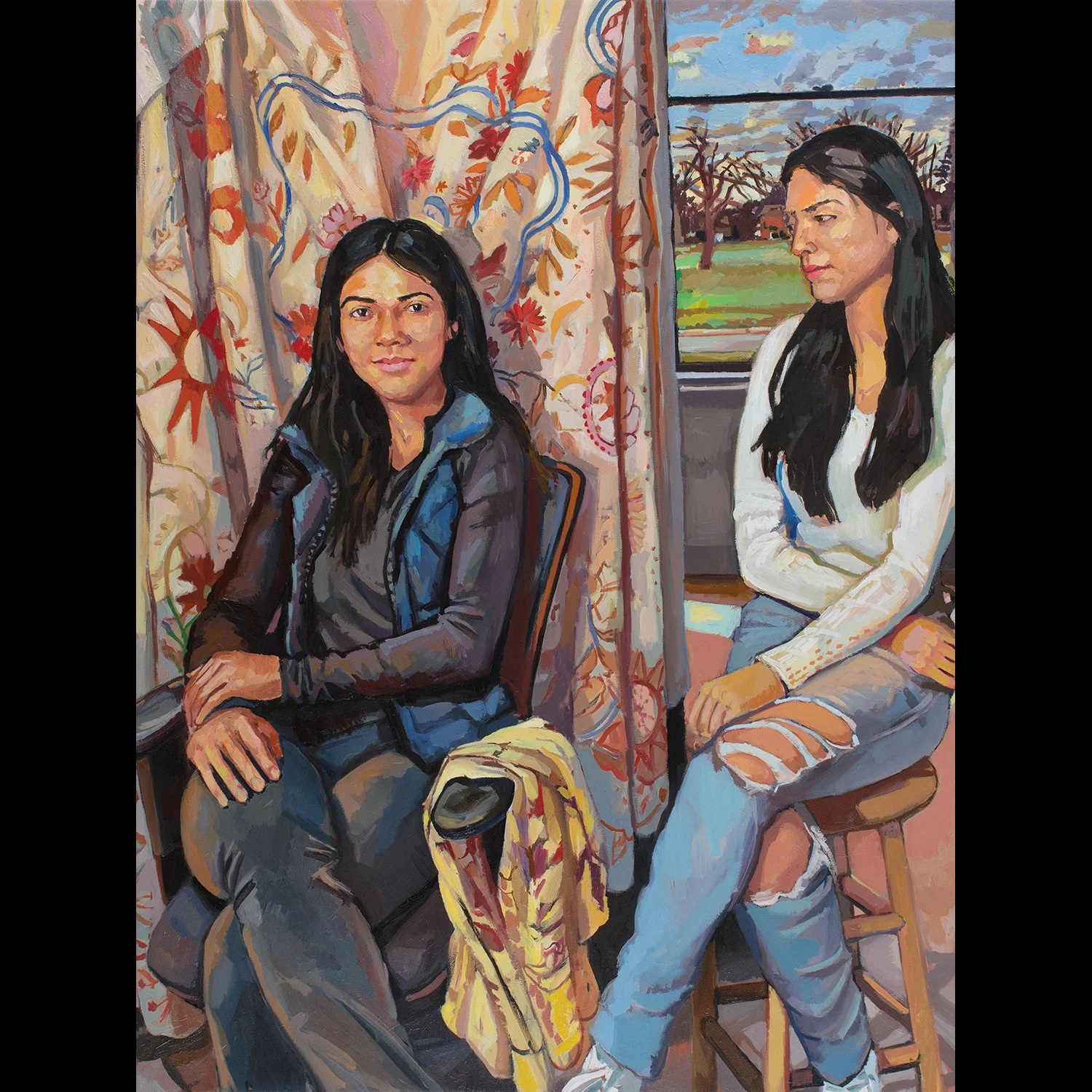Fill in the Blanks (Please) — By Elica Sue
artwork by Dan Finaldi
1.
Hushed Spectator Subtitles
I watch a culinary TV show on the screen—there is no sound coming from it (or maybe I just can’t hear it) and there are no _________. I watch the silent performance happening behind my father-in-law’s head at the Thai restaurant, and try to gauge what is being said by looking at facial expressions and reading lips.
As a break, I tap my phone for notifications (none) and zone out while my in-laws and husband converse in Spanish. I am more of a _________ than a participant: The conversation usually goes too fast for me to feel included, but more than that, when all three of them speak Spanish, I feel like I don’t know Spanish anymore, even though I took Spanish in high school and a couple classes in college and have been speaking it on and off for over 15 years and am married to a man who was born in Tepatitlán de Morelos.
In these conversations, I often miss one important word, then two, then three, then four, then five, until I find myself at a loss (of words). Other times, they say important words too ______, and before I know it (but still don’t know the words), I’m floating between the white spaces of a bank where words exist, but not in succession.
2.
Confession Difficult Sounds Women’s
My husband sits beside me, my father-in-law is in front of me, and my mother-in-law sits the furthest away from me, on the diagonal. Amidst the busy dinner hours of the restaurant, clanging, chattering, chewing, the words of her softer voice, especially, don’t even make it into the word bank—_______ voices are usually harder for me to hear.
I have a __________ : learning a spoken language is more _________ when you can’t hear it. I’m not fluent in lip-reading in other languages—their sounds make different shapes on their speakers’ lips. And my mind, already trying to comprehend the succession of words I do know and can hear, works harder to piece together the context around the words I need to fill in the blank for—the words I couldn’t hear, the ______ that escaped me.
3.
Defeat Embarrassing Empathy Repeat
So when someone asks if I speak Spanish (sometimes in Spanish), I find it’s easier for me to say “a little” or even “no” or just shake my head. It’s easier to say that, rather than say that I do (kind of) and feel my heart race for the duration of the conversation while I wonder if I will catch all the words, because if (when) I ask someone to repeat themselves repeat themselves ______ themselves before they give up and switch to English (if they know it), I’m thinking that they’re thinking I don’t really know the language, that I’m stupid, that I lied, all those monstrous thoughts. I don’t know what’s more ____________.
When learning or speaking in a second, third, fourth, fifth language, it’s often easier to switch to speaking a different, mutual language where both parties are stronger. Sometimes that giving in feels like giving up, feels like ______, even though I wonder if I might have understood if I could hear just a little bit better.
This has made me think that (spoken) language learning and hearing loss don’t go together. But maybe they do have more in common than I thought: they both find themselves in me, and if language learning is a practice in _______ and reshaping perspectives, then so is hearing loss—to be shut out of worlds you have to work harder to be a part of.
4.
Never mind Never mind Never mind
When conversing in English (my most comfortable language), and I ask for someone to repeat themselves repeat themselves repeat themselves, they either repeat it repeat it repeat it or instead just say ___________.
That word feels worse, almost like a curse. It makes me wonder what’s wrong with me (even though I know), makes me feel that my inability to hear is an inconvenience in a world full of sound, and that no matter how hard I try, my ears cannot hear better on their own. “Good luck on your hearing test!” an ENT once told me, as if I could study for it to get a better score (I’m a good student, but not that good).
Even with hearing aids, which amplify voices, I find that ambient noise and voices from other conversations are amplified, too. Hearing aids also don’t eliminate mumblers, who are hard to both hear and lip-read. Because that’s all hearing aids are—aids, not a fix, not a solution, not magic. So whether I’m wearing my hearing aids or not, I’ll sometimes find myself not hearing and smiling and nodding and hoping that whatever I said (yes or no) was the right answer.
I know that even those with “perfect” hearing have to ask for clarification sometimes and maybe it’s because I know I have hearing loss that I feel bad for asking, but I do feel like a burden for even asking “what did you say?” and hoping that this will be the time that I can hear, and hoping that __________ will not be the word that I hear.
But I always hear the never mind. Maybe because I can see it on people’s faces.
And even though ___________ means “don’t think about it,” that’s all I end up thinking about, in the end.
Elica Sue’s writing has appeared in The Gravity of the Thing, The Christian Science Monitor’s The Home Forum, and elsewhere. She is a VONA alumna and a life-long resident of Southern California.